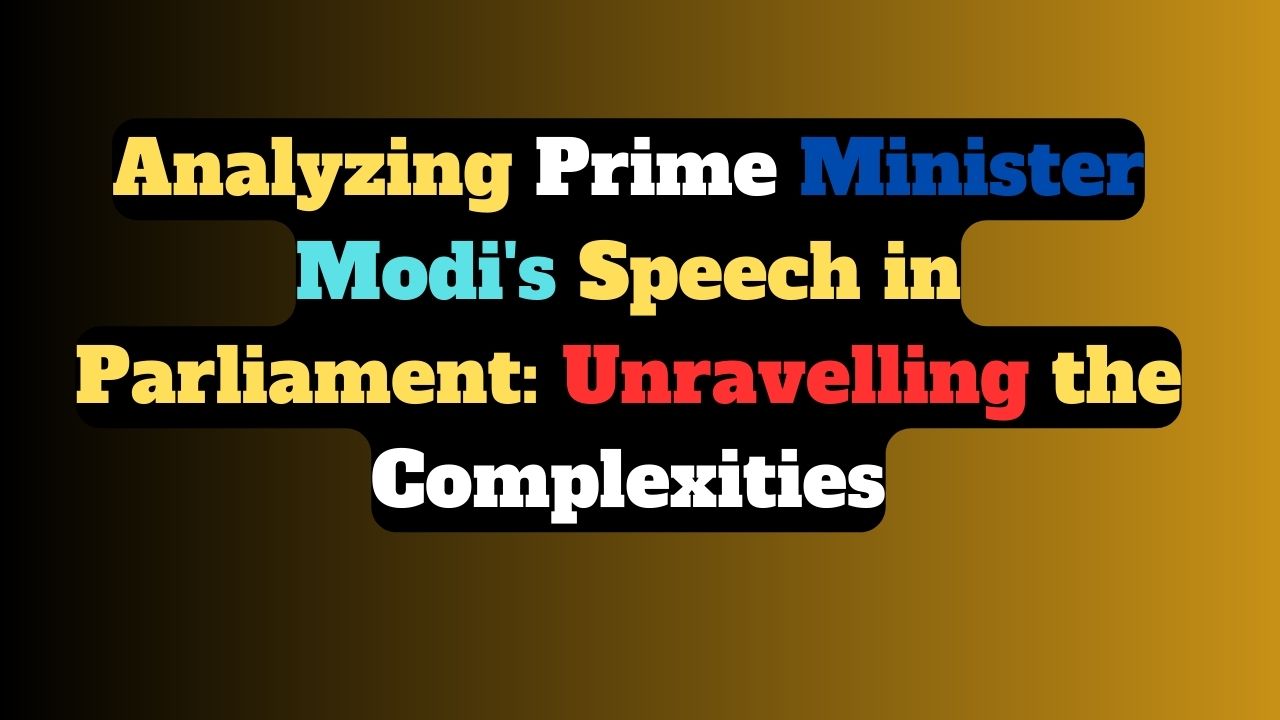Analyzing Prime Minister Modi's Speech in Parliament: Unravelling the Complexities
Investigate a thorough examination of Prime Minister Modi's latest parliamentary address, focusing on the subtle nuances of historical references, contextualization, and media criticism. Learn about the situation in Manipur, political debate, and the ramifications of the Unlawful Activities (Prevention) Act (UAPA). Investigate the complexity of leadership accountability and the significance of educated public participation.Learn about Prime Minister Modi's speech and its consequences for democracy.
In the fast-paced world of politics, determining the true meaning of speeches becomes an essential duty. Prime Minister Narendra Modi's recent speech in parliament, which lasted more than 2.25 hours, sparked conversations and debates across the country. This speech included a variety of issues, including the state of Manipur, historical settings, and the use of emotive rhetoric to convey his arguments. Let us investigate the complexities of the Prime Minister's address and peel back the layers of substance, context, and ramifications.
Navigating the Complexity: Distinct Perspectives
The Need for Clarity in Communication
In Prime Minister Modi's talks, renowned journalist Ravish Kumar emphasizes the critical need for younger generations to be able to distinguish between right and wrong. He adds that it is not only his need, but the nation's need, to critically assess the content and objectives underlying these lengthy orations.
The Role of Media and Journalism
Kumar criticizes the nature of journalism, which sometimes appears to be more focused on filling space than transmitting significant material, by drawing a link between pupils who can fill pages even without knowing the answers and the status of journalism. He advises that journalism education include debates regarding the design of news presentation and its actual information value.
The Art of Communication: A Dive into the Speech
Contextualizing the Prime Minister's Address
Kumar then deconstructs the Prime Minister's address, concentrating on the presentation of major historical incidents and their relation to current events. He emphasizes how the speech touched on events from the 1960s to the 1980s, raising concerns about the selection of examples and the omission of his own government's tenure in addressing the issues at hand.
Manipur and Its Significance
The principal focus of the discourse on Manipur piques my interest. Kumar wonders if the Prime Minister's presentation of Mizoram's history is relevant to understanding the situation in Manipur. He examines the different components surrounding the debate, such as the Indian Air Force's involvement, historical backdrop, and the broader ramifications for the present.
The Prime Minister's Historical Prophecy
A substantial amount of the Prime Minister's address focused on historical prophesies, with the Prime Minister claiming that the current period will have an impact on the following 1000 years. Kumar analyses this claim critically, highlighting the political character of such comments, which try to present the speaker as a visionary leader while avoiding addressing pressing difficulties.
The Complexity of Manipur's Discourse: Missing Voices
Parliamentary Debates and Manipur's Representatives
Kumar brings up the subject of Manipur's representatives not having enough opportunities to speak during the parliamentary debate. He wonders if the absence of speakers from Manipur and Mizoram in the debate restricts the depth of the argument and prevents a more full knowledge of the concerns.
The Underlying Political Game
Kumar examines the Prime Minister's method of using previous events to divert from modern issues, highlighting the usage of chosen instances and historical references. He emphasizes the need of delivering a whole narrative rather than cherry-picking examples to suit a specific purpose.
UAPA and Its Implications
In delving into the contentious use of the Unlawful Activities (Prevention) Act (UAPA), Kumar doubts the government's contention that the act is not used for political purposes. He describes cases in which people were imprisoned under UAPA for extended periods of time, raising worries about the larger implications for civil rights and free expression.
Conclusion: Navigating the Complexity
Kumar's research gives a vivid picture of Prime Minister Modi's parliamentary speech's complexities. He encourages audiences to interact critically with political speeches rather than accepting them at face value by scrutinizing the intricacies of historical references, context, and the absence of essential data. Citizens must use this analytical method to make informed judgments and hold leaders accountable for their words and actions.
In an age when narratives may be controlled and truths can be misconstrued, Kumar's astute critique serves as a reminder that a vigilant, informed public is essential for a functioning democracy.
Tags:
#PrimeMinisterModiSpeechAnalysis, #PoliticalDiscourse, #ManipurSituation, #HistoricalContext, #MediaCritique #UAPA #UnlawfulActivities, #PoliticalPropaganda,#LeadershipAccountability #ravishkumar #modi #pmmodi #rahulgandhi #amitshah #bjp
























